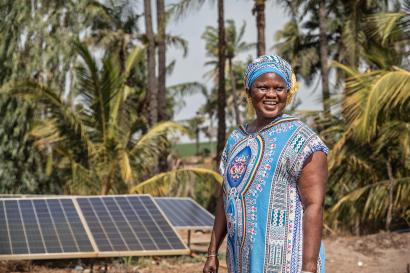Breadcrumb
Senegal

Mercy Corps has worked in Senegal since 2022, supporting economic development, food security, good governance, and increased access to sustainable, renewable energy.
The context
Named after the Senegal river that sits at its northern border, the West African nation is home to more than 18 million people. With 60% of the population under the age of 25, Senegal is a country with a youthful populace seeking opportunities to grow. While Senegal is known for being one of the most stable democracies in the region, lack of access to economic and infrastructure development are challenges to creating more sustainable livelihood.
Since many Senegalese livelihoods are dependent on agriculture and fishing, they are deeply affected by climate change causing decreasing crop production and depleting fish stocks. Climate events outside of Senegal have caused disruptions to their food security because the country imports 70% of its food. Monsoons in India have limited imports of rice, a main staple in Senegal. In addition to climate disasters, conflicts like the war in Ukraine have driven up food costs and lowered access to basic necessities. In 2022, food prices rose by an average of 15%, compared with 2.9% in 2021. Despite social and economic progress observed this last decade, the regional strain on resources, food security, and economic development makes it more difficult to create long-term opportunities.
In Senegal, 32% of households lack consistent access to reliable electricity, which is mostly powered by imported diesel fuel. Senegal’s government is prioritizing reforming fossil fuel subsidies and diversifying its energy sources to meet increased demands while also reducing costs. Even with a recent discovery south of the capital city of Dakar of an offshore field containing both oil and gas that is contributing to the government’s goal of decreasing reliance on imported oil, part of the country’s strategy to energy access includes promoting renewable energy resources.
With an emerging oil and gas industry, Senegal’s economy is expected to grow while also maintaining its reputation for stable governance. Governmental agencies like Senegal’s Ministry of Petroleum and Energy recognize the potential development for their communities with more sustainable energy solutions and that it must continue to grow its inclusive governance in order to ensure an equitable society.
Our impact
Mercy Corps partners with local entrepreneurs and businesses, mainly run by women and youth, to support communities as they recover from high unemployment, lack of energy access, and governance concerns. Through our program activities we are making an impact across these areas:
Plugging into renewable energy sources to increase economic opportunities
Mercy Corps aims to lower costs for agricultural businesses, which employ over 60% of the workforce in Senegal. Through our energy access platform, we have provided sustainable, renewable energy access to over 650,000 people—including more than 5,000 entrepreneurs. When businesses can run on renewable resources, they lower upfront costs, grow more crops, and increase nutrition and food security in their communities.
Mercy Corps supported more than 150 women-owned businesses to invest in solar energy, many of whom were smallholder farmers who improved their livelihoods. Farmers increased their crop yields due to access and financing for climate-smart solutions like solar irrigation provided by Mercy Corps. In regions without consistent or reliable access to electricity, solar energy is vital to powering their processing equipment. Farmers strengthened local food production and reduced their reliance on imported food products, creating more economic opportunities for themselves and their communities while also bolstering their resilience to climate change.
Piloting innovative technology projects to build more sustainable livelihoods
From gig workers to farmers and fisherfolk, Mercy Corps is piloting innovative technologies to connect workers to jobs and support agricultural livelihoods. Through partnerships with local organizations, we are providing consistent climate and weather pattern communications to small-scale agricultural producers who are using the technology to make more accurate, sustainable decisions to maintain their businesses as they manage the effects of climate change across Senegal. As a member of the Jobtech Alliance, we are supporting technology across Senegalese platforms to connect people to more economic opportunities including job matching and online marketplaces. Through community building on the platforms, participants are accessing more livelihood options.
Creating inclusive governance by promoting more equitable access to energy
Mercy Corps is providing support to Senegal's Ministry of Petroleum and Energy to promote more inclusive policies that will increase women’s access to renewable energy. Equitable access to resources creates more opportunities for women to create and share economic development alongside the rest of their community. Through awareness campaigns with local leaders and community members, participants underscored the importance of promoting renewable energies to strengthen the resilience of women and girls, particularly since climate change has created disaster risks in their own communities. Mercy Corps is collecting information from the community trainings to create a guide that can inform more inclusive policies from the Ministry of Petroleum and Energy.